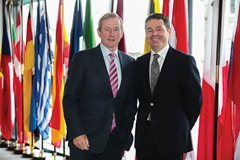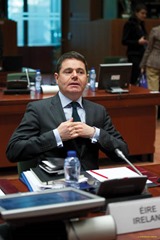Tackling the jobs crisis
 Irish Minister of State for European Affairs Paschal Donohoe wants Europe to translate growth into employment as Ireland integrates its economy further into the euro zone.
Irish Minister of State for European Affairs Paschal Donohoe wants Europe to translate growth into employment as Ireland integrates its economy further into the euro zone.
He discusses his role with Peter Cheney.
A rapid turn of events led to Paschal Donohoe taking up his first ministerial posting last July. Lucinda Creighton’s resignation led to the Dublin Central TD’s high profile promotion. The Minister of State for European Affairs is a joint posting between the Department of the Taoiseach and the Department of Foreign Affairs and Trade.
“I have found it extremely enjoyable and very, very rewarding and very interesting,” Donohoe tells eolas. “There is such a need and opportunity to engage with other European countries across a whole breadth of issues and opportunities.” Jobs, stability and growth – the same themes as the Irish Presidency – are his main priorities.
Two achievements stand out to date.
Much of his work involves meeting counterparts from other countries at a time “when so much change is taking place in Europe.” He’s pleased to develop relationships with individual countries but his remit also means “a lot of time engaging with MEPs” especially over the banking union negotiations.
“The second thing that will always stand out in the work that I do,” Donohoe adds, “is the support I give to Irish companies and the work that they do abroad.” The best example to date has been his St Patrick’s Day visit to Brussels and Luxembourg, particularly geared towards supporting food exporters. In addition, he raises relevant business issues with other European countries and institutions e.g. access to credit for Irish SMEs via the European Investment Bank, the digital economy and how the single market can better support Irish companies.
The proposed Transatlantic Trade and Investment Partnership (TTIP) between the EU and USA is also raised in these discussions. Talks formally started last year but critics claim that free trade will mean lower standards e.g. over GM foods.
“I am aware of concerns that people have in relation to the deal, if such a deal were to be negotiated,” he remarks when the critique is put to him. “I firstly am very confident that if a deal is to be reached, that it would respect the consumer standards and the concerns that people would have regarding social issues.”
Donohoe also points to the “absolutely immense” potential win for the Republic given the drive among Irish companies to export services. TTIP could deliver a “level playing field between Ireland and America” in this area. While the Commission is leading on the negotiations, any deal would ultimately have to be ratified by member states and the European Parliament.
On the banking union, it is put to him that once Irish sovereignty is transferred on that issue, it cannot be returned.
“I have always believed that you should only pool your sovereignty where this is a demonstrable benefit for doing so,” he responds. “I actually think banking union is a clear example of where that demonstrable benefit exists.”
Where banks get into “grave difficulty” and cross-border arrangements for dealing with those problems are not in place, the burden then falls on individual countries. The banking union would ensure that systemic bank failure is “dealt with more efficiently and fairly.”
Europe in 2014
 As the Minister of State has indicated, Europe is in flux. Pressed on the continent’s general direction, he answers in two ways: economically and politically.
As the Minister of State has indicated, Europe is in flux. Pressed on the continent’s general direction, he answers in two ways: economically and politically.
“There is a growing sense of stability within the European economy overall and some promising signs of growth,” he comments, welcoming how this is uplifting national economies after a prolonged recession in the euro zone.
Whereas the very existence of the euro was being questioned 18 months ago, Donohoe thinks that “the level of crisis has now been dealt with” but the crisis is now one of jobs. There is still “a huge amount that needs to be done to ensure that the current signs of recovery that we have feed into job creation.”
Politically, he expected that up to half of the MEPs elected in May could be newcomers and the leaders of the key EU institutions will change in the second half of this year. “Member states such as Ireland will be working hard to ensure that our interests are recognised and protected across that period,” he notes.
Donohoe was a commercial director with Procter & Gamble before entering politics. He has now visited 16 countries since taking office.
Outside work, his young family – wife Justine and two children – is his “number one priority”. He listens to a range of music and is a keen reader – although this now means plenty of books about European politics, history and economics alongside Irish and American crime fiction. Donal Ryan is a favourite author.
What about his ambitions? The overall one is “to do this job as well as I can” and he admits that he will have to work “very, very hard to get re-elected”. Politicians, when asked that question, are usually too diplomatic to aim too far ahead. His own view is that this is his dream job and he’s “very privileged” to do it.
Career paths lead to Europe
Minister Donohoe is keen to promote EU jobs as opportunities for graduates. “The more they [the institutions] reflect the make-up of the countries within the EU, the better they will be in terms of developing policies and evaluating options for Europe as a whole,” Donohoe remarks. More information is available at www.eujobs.ie
As of 1 January this year, 450 Irish citizens worked in the Commission: a 1.9 per cent share which compares well with its 0.9 per cent population share. However, the UK is under-represented by comparison: 4.4 per cent of officials despite having 12.4 per cent of the EU’s population. The Foreign Office is very keen to increase British recruitment. EU careers information is available through www.gov.uk and by emailing eucareers@fco.gov.uk





